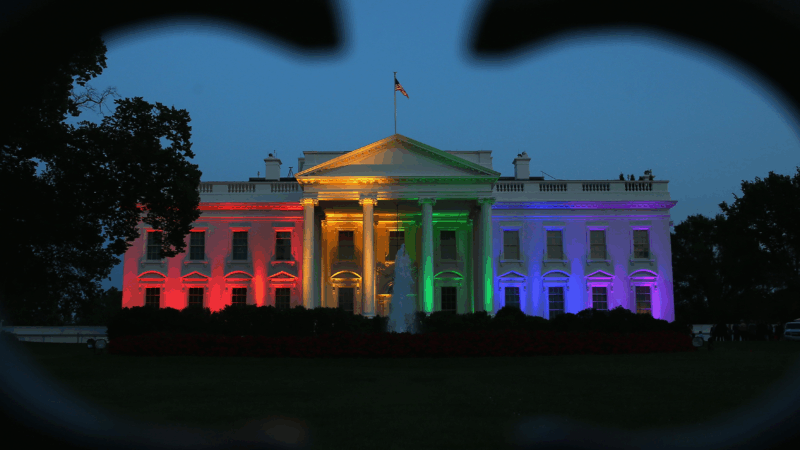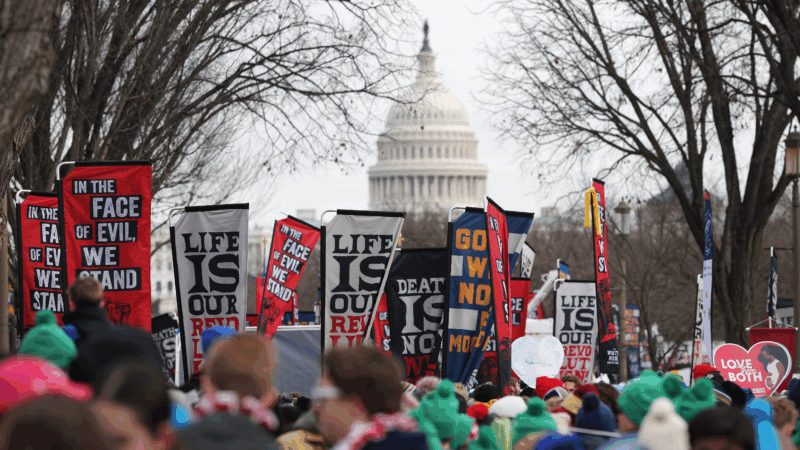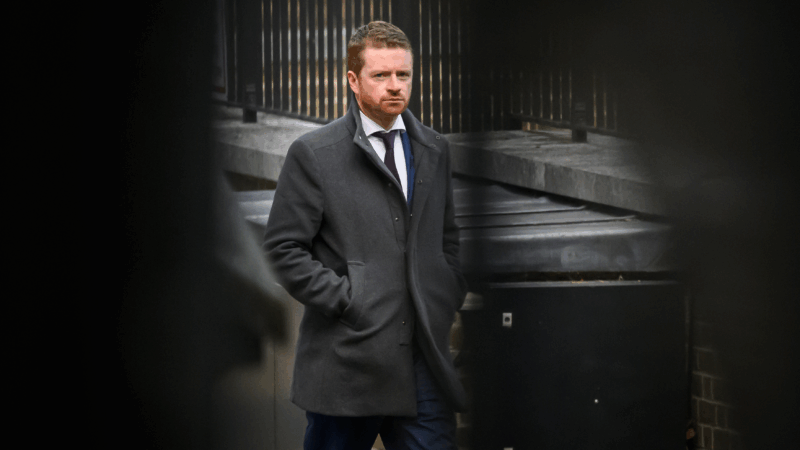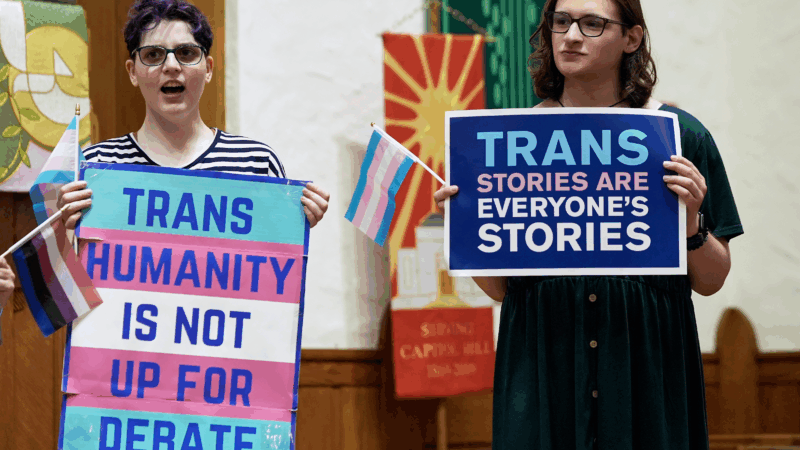‘Equal dignity’: U.S. map shows the impact of Obergefell v. Hodges decision
“They ask for equal dignity in the eyes of the law,” then-Supreme Court Justice Anthony Kennedy wrote 10 years ago, in the Obergefell v. Hodges majority opinion. “The Constitution grants them that right.”
With those words, on June 26, 2015, same-sex marriage became legal in all U.S. states. The landmark 5-4 decision superseded what had been a patchwork of laws and court orders in which some states allowed gay marriages or same-sex civil unions, while others banned them and refused to recognize unions performed outside their borders.
“The right to marry is a fundamental right inherent in the liberty of the person,” the Supreme Court ruled.
The dramatic shift was captured in a map NPR published in 2015, as the Supreme Court ruled that equal protections under the 14th Amendment require states to license and recognize same-sex marriages.
Loading…
Before the ruling, gay marriage was legal in 37 states and the District of Columbia. But only 16 of those states had affirmatively legalized same-sex marriage; the rest had bans on the books that federal courts had found unconstitutional. The Supreme Court took up the Obergefell case after the 6th Circuit Court of Appeals sustained bans in Ohio, Michigan, Kentucky and Tennessee in November 2014.
Same-sex marriage was debated for decades, but few states acted to codify such unions, such as Hawaii’s move to offer reciprocal beneficiary relationships in 1997.
Then Massachusetts legalized same-sex marriage in 2004.
“We felt we were married already,” Marcia Kadish later told NPR, recalling how she and Tanya McCloskey became the first same-sex couple to marry under the state’s law. “This was just making it legal.”
And in 2015, Obergefell arrived as a watershed moment. Immediately after the ruling, same-sex couples began getting married around the country.
“It’s amazing how fast it went from being nothing to being legally married. In the work of an hour, I guess — although, decades of struggle,” Lauren Brown of East Lansing told Michigan Public in 2015, as she married Lindsey Wren at the Ingham County Courthouse.
Brown, Wren and other couples were able to marry within hours of the ruling.
“I’m glad we were seen as actual people to get married today, which is great and I feel like I’m going to cry again,” Lori Hazelton told Michigan Public in Muskegon County. “Love is love regardless.”
In Savannah, Ga., Christie and Kindra Baer celebrated their marriage after being together for 13 years. Christie Baer told Georgia Public Broadcasting that their new legal status would ease their worries about raising two children: previously, she had been unable to adopt Kindra’s daughter.
“It’s very stressful to be in a relationship and know that at any point and time if you break up this child who you have raised as your own could be taken away from you,” Christie said.
In the decade since Obergefell, the biggest impact has been in the South, according to the Williams Institute at the UCLA School of Law.
“From 2014 to 2023, the percentage of cohabiting same-sex couples who were married grew by 21% in the South (38% to 59%),” the institute said in a report inspired by the Obergefell v. Hodges anniversary.
As of this month, the U.S. had an estimated 823,000 married same-sex couples — more than twice as many as 10 years ago, the report states, citing data from the American Community Survey.
Ten years after the ruling, legal standing for people who want to marry someone who isn’t of the opposite sex still rests in the Supreme Court decision.
In 2022, the Respect for Marriage Act became law, after gaining bipartisan support in Congress. The federal law redefines marriage as being “between two individuals,” rather than a man and a woman. It also bars states from denying “any right or claim relating to out-of-state marriages on the basis of sex, race, ethnicity, or national origin.”

But as with the abortion battle over Roe v. Wade, opponents of same-sex marriage say they want the Supreme Court to reconsider its Obergefell ruling. This year, state lawmakers in Idaho, Montana, Michigan, Oklahoma and other states have taken up resolutions calling for a high court review.
Supreme Court Justices Clarence Thomas and Samuel Alito, who dissented in the 2015 majority ruling, have suggested they’re open to that idea. In 2020, as the court declined to hear a case brought by Kim Davis, a former county clerk in Kentucky, the pair wrote that the court had created a problem only it could fix.
“Until then, Obergefell will continue to have ruinous consequences for religious liberty,” they added.
Seahawks win Super Bowl title, pounding the Patriots 29-13
Seattle's "Dark Side" defense helped Sam Darnold become the first quarterback in the 2018 draft class to win a Super Bowl, to win the franchise's second title.
No, that wasn’t Liam Conejo Ramos in Bad Bunny’s Super Bowl halftime show
A publicist for Bad Bunny confirmed to NPR that the little boy in a blue bunny hat detained by ICE in Minneapolis last month did not participate in the Super Bowl halftime show.
March for Life attendees may have been exposed to measles, DC Health warns
D.C. health officials are contacting people possibly exposed to measles at the March for Life in January, as confirmed cases rise nationwide.
U.S. gave Ukraine and Russia June deadline to reach peace agreement, Zelenskyy says
"The Americans are proposing the parties end the war by the beginning of this summer," Zelenskyy said, speaking to reporters on Friday.
U.K. leader’s chief of staff quits over hiring of Epstein friend as U.S. ambassador
British Prime Minister Keir Starmer's chief of staff resigned Sunday over the furor surrounding the appointment of Peter Mandelson as U.K. ambassador to the U.S. despite his ties to Jeffrey Epstein.
Trump administration lauds plastic surgeons’ statement on trans surgery for minors
A patient who came to regret the top surgery she got as a teen won a $2 million malpractice suit. Then, the American Society of Plastic Surgeons clarified its position that surgery is not recommended for transgender minors.








